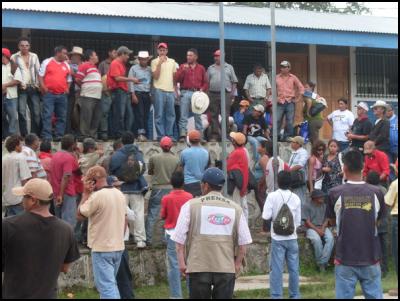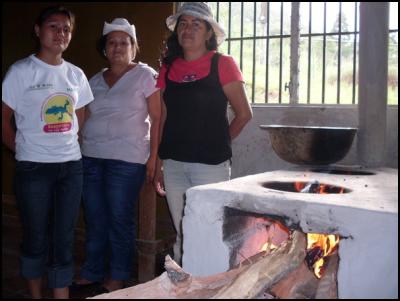IV with Honduran political refugee in Las Manos
Interview with Honduran political refugee in Las Manos
July 27th 2009
By toni solo for Tortilla con Sal
This is the translation of an interview Tortilla con Sal did together with a reporter from Radio Globo with a man from Tegucigalpa who is currently on the Nicaraguan side of the Las Manos Honduran-Nicaraguan border.
Like thousands of other Hondurans, the person we interviewed intended to accompany President Manuel Zelaya in his recent attempt to return, peacefully, to Honduras. Due to the Honduran Army's brutal repression of those who attempted to accompany Zelaya, however, and the threat of being detained and taken to an improvised prison camp in Danlí, he was obliged to flee to Nicaragua.
In order to cross the border he and about 80 others walked all night across the southern mountains of Honduras. The group broke up to evade troops pursuing them, about half the group may have been captured.
Currently, approximately 5,000 Hondurans have sought refuge in the Nueva Segovia region of northern Nicaragua after fleeing under similar circumstances to those described by the interviewee. The number is steadily growing, however, as more and more Hondurans are forced to flee to Nicaragua to escape the Army's tear gas, live rounds and mass detentions.

Click for big version
"Hondurans in Las Manos meet to organize food, accommodation and health care arrangements"

Click for big
version
"Three Honduran women get ready to
prepare food for the hundreds of people who arrived on
Sunday July 26th"
TcS: On Friday (July 24th) there were about 300 or 500 Hondurans here. I personally can confirm that the number was between 300 and 500. But now there are many more.
Honduran: Yes, today there are many more. People keep on crossing the border because they are being rounded up on the other side in El Paraíso. Our aim was to come here to Las Manos (border point) to meet our President. But in the end we were subjected to repression, were we physically attacked with tear gas. They wanted to break up the protests (in favour of Zelaya).
Then we found out they were preparing the stadium in Danlí. They were going to take us there, like to a concentration camp. So we decided it was better to break through the military circle and come to Nicaragua.
TcS: So you walked over the mountains?
Honduran: We walked over the mountains, through the fields and forests, evading the military.
TsC: How many hours did you walk for?
Honduran: We walked for approximately twelve hours, overnight.
Radio Globo: Are you planning to return to Honduras?
Honduran: We are not going to return to Honduran until the constitutional order is reinstated, until the constitutional guarantees are reinstated.
Radio Globo: Why don't you want to go back?
Honduras: Because we believe that there is no security in Honduras at the moment, that if we go back we will be detained. Because a permanent state of siege has been implemented in El Paraíso. So we declare ourselves exiles here, war refugees.
Because really we are in a war, a war, its just that we are waging an unarmed war. The army is the one that has the weapons, the one that is murdering our people.
TcS: Since you came here what support have you recieved, in terms of food ... ?
Honduran: We have been recieving support here from the Committee of Solidarity with Honduras from Nicaragua, and we really appreciate all the support they have given us.
We have also recieved immense support from the people of the border region, both in Honduras and in Nicaragua, who have showed their solidarity with us. We truly appreciate all the support we were given while we were travelling across the mountains.
Radio Globo: Did you see soldiers or other repressive forces in the mountains, with arms, or anything?
Honduran: We were chased by a group of soldiers, but we were able to escape fleeing to another zone. But some of our companions were captured.
Radio Globo: How many were there in your group and how many were captured?
Honduran: In the group I was originally travelling with there were about 80 people. But later, after we fled the soldiers, fourteen of us managed to meet up again, and with that group of fourteen I travelled to Nicaragua. Later on, another group of eight of the original group of eighty turned up here. I don't know what happened to the others. I think another small group is here. I'm not sure.
Radio Globo: So there is a load of people that didn't make it here, that have been detained?
Honduran: Loads of people are trying to make it here, but they are being captured because the Army have troops in the antennae [mobile phone masts] monitoring the movement of people from above.
Radio Globo: And helicopters?
Honduran: Yes. A helicopter flew over our group, I think that was how the Army detected us and tried to detain us. But a number of us managed to escape.
TcS: Do you guys feel that you will be able to stay here for a while? Are you willing to resist, here, for a long time?
Honduran. We are in a state of permanent resistance and here nobody surrenders. We are going to carry on resisting until we achieve victory, until our president is able to return to power in Honduras.
ENDS


 Keith Rankin: Rational Expectations, Intelligence, And War
Keith Rankin: Rational Expectations, Intelligence, And War Peter Dunne: Dunne's Weekly - Is Andrew Little Wellington's Mayor-In-Waiting?
Peter Dunne: Dunne's Weekly - Is Andrew Little Wellington's Mayor-In-Waiting? Gordon Campbell: On Peter Dutton’s Fading Election Prospects.
Gordon Campbell: On Peter Dutton’s Fading Election Prospects. Binoy Kampmark: Withdrawal Symptoms - Hungary, Europe And The International Criminal Court
Binoy Kampmark: Withdrawal Symptoms - Hungary, Europe And The International Criminal Court Martin LeFevre - Meditations: No Silver Lining, Just An Opening
Martin LeFevre - Meditations: No Silver Lining, Just An Opening Gordon Campbell: On The Clash Between Auckland Airport And Air New Zealand
Gordon Campbell: On The Clash Between Auckland Airport And Air New Zealand